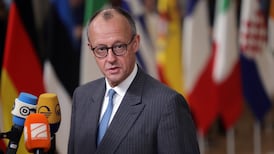One of Emmanuel Macron’s most ambitious goals when he came to office in 2017 was to reconcile opposing French and Algerian visions of their shared history.
As the first French president born after the 1954-1962 Algerian War, he seemed well-suited to the task. During his election campaign, Macron angered French conservatives by declaring, in Algiers, that colonisation was “a crime against humanity ... true barbarity”.
Yet the past month has seen a severe, continuing crisis in Franco-Algerian relations, not unlike those provoked by François Mitterrand when he criticised the abrogation of Algeria's first democratic elections in 1991, or the adoption of a text in the National Assembly vaunting "the benefits of colonialism" in 2005.
The present crisis began when Macron announced on September 28th that France would halve the number of visas issued because Algeria accepts so few of the citizens that France wants to send back, mainly illegal immigrants and newly released prisoners, including Islamists who have completed sentences for terrorism convictions.
The number of French visas issued to Algerians had already plummeted from 274,421 in 2019 to 73,276 in 2020, according to the French interior ministry. Of the 7,731 Algerians whom France tried to repatriate in the first six months of this year, only 22 were accepted by Algeria.
The French ambassador to Algiers was summoned in protest the day after the visa announcement. Two days later, Macron received 18 youths of Algerian origin at the Élysée Palace, as part of his campaign to foster understanding. He criticised Algeria’s “rewriting of history”, which he said was the result of “hatred of France”.
Macron's description of the Algerian regime as a "politico-military system which is built on this exploitation of memory" particularly enraged Algiers, though it rang true to those familiar with the country. Back in 1980, Mohamed Harbi, the most famous Algerian historian, called his country's political system "a state owned by the army". Macron's suggestion that there was no Algerian nation before the 1830 French invasion was equally inflammatory.
Algerian president Abdelmadjid Tebboune denounced Macron's "inadmissible interference" in Algerian affairs, his "intolerable affront" to Algerians who died fighting the French and "crimes of colonial France in Algeria" which "fit the strongest definitions of genocide".
Algeria recalled its ambassador to Paris and forbade French military flights bound for Mali, Niger and Chad from traversing Algerian airspace. The flights support Operation Barkhane, which is fighting Islamist insurgents like those who ravaged Algeria in the 1990s.
France occupied Algeria for 132 years, leaving only after a horrific war in which both sides maimed, tortured and murdered on a massive scale. Benjamin Stora, the best known French historian of Algeria, published a 150-page report last January commissioned by Macron to propose ways of overcoming historical differences.
Bilateral trade
"The French colonisation of Algeria had a lot in common with the British colonisation of Ireland, " Stora said in an interview.
“In the 1930s, Messali Hadj, the pioneer of the independence movement, wrote about the Irish struggle against the British. Both populations were dispossessed of their land as well as their identity. Both had to reappropriate their language after independence, and in both, religion was a vehicle for political nationalism.”
Algeria and France do not agree on the most basic facts. Stora estimates that between 300,000 and 400,000 Algerians were killed in the eight-year war of independence. As a portion of population, that was comparable to French losses in the first World War. The Algerian government has always claimed the French killed 1.5 million people.
Franco-Algerian disputes are also economic. Bilateral trade has dropped from €13.2 billion in 2011 to €6.3 billion in 2020. French businesses recently lost big contracts for water distribution and the Algiers metro. China now exports far more to Algeria than France does.
Algeria accuses France of harbouring its enemies, including Ferhat Mehenni, the leader of a movement that demands self-determination for the Kabylie region, and the Al-Magharibia television station, which supports the Hirak protest movement.
Macron has carried out or set in motion a dozen of Benjamin Stora's recommendations for defusing Franco-Algerian history. Macron visited the home of Maurice Audin, the Communist mathematician who was murdered by the French in Algiers because he supported the Front de libération national.
He received the grandchildren of Ali Boumendjel, an Algerian nationalist leader assassinated during the Battle of Algiers, at the Élysée. He apologised to the Harkis, Algerians who were abandoned by the French after fighting alongside them.
On October 16th, Macron became the first French president to visit the scene of the murders of dozens of Algerian protesters by French police at the Bécon bridge on the outskirts of Paris. Stora says about 30 Algerians were killed that night, and a total of 100 were murdered over the last two weeks of October, 1961. The left condemned Macron for failing to use the words “state crime”. The right accused him of “anti-French victim propaganda”.
“In six months, we have made more concrete gestures than in 60 years,” Stora says. “I don’t care about the semantic quarrels. This will go down in history.”
No gestures
The Algerians, Stora laments, "have made no gestures, no proposals, no comments" on any of the French efforts, which include building a memorial to the 19th century Algerian freedom fighter Emir Abdelkader at Amboise, where he was imprisoned, and attempting to make amends for French nuclear tests in the Sahara.
None of this augurs well for plans for a commemoration of the 60th anniversary of the Évian Accords, which led to the end of the Algerian war, next March 19th.
Stora says the Algerian regime “constantly goes on about French colonialism... They keep demanding that France admit things it has already admitted to”.
Dr Abdelmadjid Chikhi, the head of Algerian archives who was chosen to work on historical issues with Stora, has produced no report and refuses to talk to western journalists.
Perhaps antagonism will subside in a few more decades, when all those who participated in the Algerian war are dead, I suggest.
“But the difficulties, silences and misunderstandings have been going on for 60 years,” Stora says. “It has been transmitted from one generation to the next, and that is the problem.”











